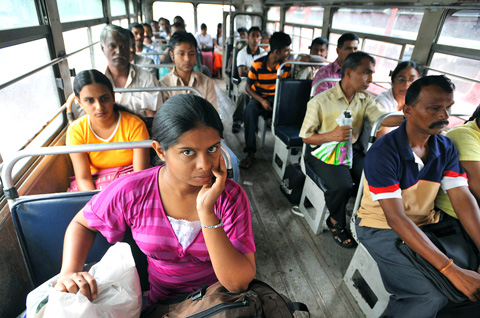Each time Indika Jayawickrema uses public transport, his wife Chamindri anxiously waits for a telephone call to let her know he has safely reached his destination.
His journey is one that has become more risky recently as a wave of bomb attacks targeting civilians sweeps through Sri Lanka, which is in the midst of 36-year-old civil war.
“With a 10,000 rupee [US$93] monthly pay, an infant and a wife to maintain, I can only afford the bus,” he shrugs outside a bus stop in Colombo, a day after twin bus bombs on Friday killed 23 people.

PHOTO: AFP
Sri Lanka’s defense ministry blames Tamil Tiger rebels for a string of attacks against civilian targets that have killed more than 170 and injured over 500 since January.
Attacks against civilians are of little strategic military or political importance, but they heighten public insecurity, said Ajai Sahni, head of the New Delhi-based Institute for Conflict Management.
“If you look at the pattern, they [the attackers] are hitting the softest of soft targets, the poorest of the poor, the most unguarded population. The sheer volumes doesn’t allow meticulous checking to prevent future attacks,” he said.
However, the Colombo-based government is not easing up and instead has poured a record US$1.5 billion into this year’s war effort, hoping for a quick end to a conflict that has left tens of thousands dead.
Endless bloodshed is also taking a toll on the island nation’s finances, where inflation last month hit a high of 26.6 percent, fuel prices were recently raised by 30 percent and bus fares by 27.7 percent.
“We have to first look after our safety, in spite of economic hardships,” said Sudeepa Jayakody, who drives a private minibus carrying office workers to Colombo.
Jayakody, who narrowly escaped on Friday morning’s bus bomb, wants to buy a motorbike to escape the dangers of public transport.
“I tell everybody, Tamils, Muslims and Sinhalese, if you can afford it, hire private transport, buy a bike, rather than risk your life on a train or bus,” Jayakody said.
But many, like financial analyst Anchana Kathirgamathamby and stockbroker Mohandas Thangarajah, say they have no choice but to use the bus.
“I can’t afford to take cabs,” Kathirgamathamby said, calling the security situation “scary.”
“Each time I step into a bus or stand at a bus stop, I try to be aware of people around me, the surroundings, people carrying bags and try to keep my distance from them,” she said.
Thangarajah, a minority ethnic Tamil, says the rebels are “knowingly or unknowingly waging an economic war” on hapless civilians.
“Terrorism is hitting people who are barely making ends meet. People are living on the edge,” he said.
The situation is worse for minority Tamils who live in and around the capital of Colombo.
“Each time an incident happens, Tamils in the surrounding areas are detained for hours, their houses are searched. I can’t remember ever being so scared, as we are now,” said a Tamil lawyer, who declined to be named.

DOUBLE-MURDER CASE: The officer told the dispatcher he would check the locations of the callers, but instead headed to a pizzeria, remaining there for about an hour A New Jersey officer has been charged with misconduct after prosecutors said he did not quickly respond to and properly investigate reports of a shooting that turned out to be a double murder, instead allegedly stopping at an ATM and pizzeria. Franklin Township Police Sergeant Kevin Bollaro was the on-duty officer on the evening of Aug. 1, when police received 911 calls reporting gunshots and screaming in Pittstown, about 96km from Manhattan in central New Jersey, Hunterdon County Prosecutor Renee Robeson’s office said. However, rather than responding immediately, prosecutors said GPS data and surveillance video showed Bollaro drove about 3km

Tens of thousands of people on Saturday took to the streets of Spain’s eastern city of Valencia to mark the first anniversary of floods that killed 229 people and to denounce the handling of the disaster. Demonstrators, many carrying photos of the victims, called on regional government head Carlos Mazon to resign over what they said was the slow response to one of Europe’s deadliest natural disasters in decades. “People are still really angry,” said Rosa Cerros, a 42-year-old government worker who took part with her husband and two young daughters. “Why weren’t people evacuated? Its incomprehensible,” she said. Mazon’s

‘MOTHER’ OF THAILAND: In her glamorous heyday in the 1960s, former Thai queen Sirikit mingled with US presidents and superstars such as Elvis Presley The year-long funeral ceremony of former Thai queen Sirikit started yesterday, with grieving royalists set to salute the procession bringing her body to lie in state at Bangkok’s Grand Palace. Members of the royal family are venerated in Thailand, treated by many as semi-divine figures, and lavished with glowing media coverage and gold-adorned portraits hanging in public spaces and private homes nationwide. Sirikit, the mother of Thai King Vajiralongkorn and widow of the nation’s longest-reigning monarch, died late on Friday at the age of 93. Black-and-white tributes to the royal matriarch are being beamed onto towering digital advertizing billboards, on

POWER ABUSE WORRY: Some people warned that the broad language of the treaty could lead to overreach by authorities and enable the repression of government critics Countries signed their first UN treaty targeting cybercrime in Hanoi yesterday, despite opposition from an unlikely band of tech companies and rights groups warning of expanded state surveillance. The new global legal framework aims to bolster international cooperation to fight digital crimes, from child pornography to transnational cyberscams and money laundering. More than 60 countries signed the declaration, which means it would go into force once ratified by those states. UN Secretary-General Antonio Guterres described the signing as an “important milestone,” and that it was “only the beginning.” “Every day, sophisticated scams destroy families, steal migrants and drain billions of dollars from our economy...